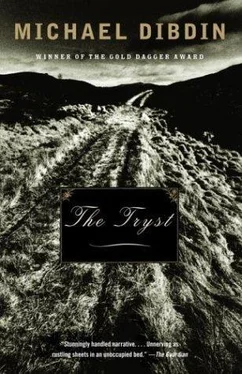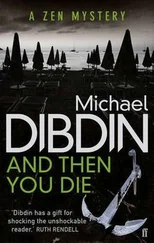Michael Dibdin - The Tryst
Здесь есть возможность читать онлайн «Michael Dibdin - The Tryst» весь текст электронной книги совершенно бесплатно (целиком полную версию без сокращений). В некоторых случаях можно слушать аудио, скачать через торрент в формате fb2 и присутствует краткое содержание. Жанр: Триллер, на английском языке. Описание произведения, (предисловие) а так же отзывы посетителей доступны на портале библиотеки ЛибКат.
- Название:The Tryst
- Автор:
- Жанр:
- Год:неизвестен
- ISBN:нет данных
- Рейтинг книги:4 / 5. Голосов: 1
-
Избранное:Добавить в избранное
- Отзывы:
-
Ваша оценка:
- 80
- 1
- 2
- 3
- 4
- 5
The Tryst: краткое содержание, описание и аннотация
Предлагаем к чтению аннотацию, описание, краткое содержание или предисловие (зависит от того, что написал сам автор книги «The Tryst»). Если вы не нашли необходимую информацию о книге — напишите в комментариях, мы постараемся отыскать её.
The Tryst — читать онлайн бесплатно полную книгу (весь текст) целиком
Ниже представлен текст книги, разбитый по страницам. Система сохранения места последней прочитанной страницы, позволяет с удобством читать онлайн бесплатно книгу «The Tryst», без необходимости каждый раз заново искать на чём Вы остановились. Поставьте закладку, и сможете в любой момент перейти на страницу, на которой закончили чтение.
Интервал:
Закладка:
Aileen’s first contact with the boy had been when one of the nurses brought him into the ward sitting room in the middle of her morning open group, a low-key affair providing general supportive counselling. The moment Aileen caught sight of him, she felt as though someone had laid a velvet-gloved hand on her heart: a touch that was soft, gentle, warm, yet almost unbearably intrusive and intimate. There were at least a dozen people in the room, yet she felt utterly isolated. The surroundings seemed to shimmer and tremble as though she were about to faint. Nor would that have been very surprising, given the strength of her conviction that the boy standing in front of her was her dead child.
It lasted only a few moments. Then, as with deja vu , reality closed ranks and blandly asserted that nothing of the sort had happened, that she must have imagined the whole thing. Aileen’s new patient was an unremarkable adolescent with the puffy unfinished look of his age, like partially baked dough. His reddish hair was cropped close to the skull in one of the currently fashionable styles that Aileen, who struggled to keep up with these things like someone running after a bus, still associated with conscription or lice. He and the nurse were still only midway across the room, which was how Aileen knew that no more than a few moments had passed.
In the course of this and subsequent encounters, Aileen noted her observations for the boy’s file. Apart from a predominantly blank or wary expression, his appearance was fairly normal. His level of education was evidently low to non-existent, although he was intelligent enough. He tended to be shy and withdrawn, never speaking unless spoken to, and then usually only a word or two at a time. It was what he said that revealed disturbance. As Aileen was so unwisely to announce to her husband, Gary Dunn had claimed that someone was trying to kill him.
The Unit’s standard report form contained a box labelled ‘Delusions: systematized/unsystematized’, with space below for further details. Aileen ticked ‘systematized’ and added ‘persecution, guilt (?), ideas of reference’. The consultant psychiatrist would decide, but to Aileen none of this seemed schizoid. The hells in which schizophrenics suffer appallingly real torments look from the outside like a montage cobbled together from a variety of no-hope films featuring leaden plots, unconvincing special effects and rotten acting. But Gary’s story was simple, straightforward and consistent. ‘There’s this bloke, the one who did it. He knows I seen him. He’s after me. He’s going to do me too.’ When asked what this man looked like, the boy replied that he walked funny, like he needed to go to the toilet, and smiled a lot, only it wasn’t a real smile. Aileen highlighted this in her report. Unlike patients suffering from paranoid schizophrenia, who tend to identify their persecutors with anybody and everybody from one of the cleaners to a television announcer, Gary Dunn apparently had a specific individual in mind. As for the famous aural hallucinations, these proved to consist simply of a voice saying such things as ‘You’ll be sorry’, ‘I’ll get you’, and ‘You’ll wind up the same way’. This, too, was quite unlike the sadistic ranting or insinuating murmurs to which schizophrenics are subjected. Finally, Aileen noted that there was no inappropriacy of affect. One characteristic of schizophrenia is that emotional cause and effect gets out of synch. Patients laugh indifferently even as they describe in lurid detail the fiendish schemes which they claim are being devised to bring about their downfall. Gary, on the other hand, evidently found it almost intolerably distressing to talk about the supposed threat to his life. More than once, indeed, Aileen felt almost inclined to doubt whether this was necessarily a delusion. After all, murder had been done and no arrest had been made. The police had released Gary for lack of evidence, but they still suspected that he’d been involved in some way, and probably knew who had done it. Supposing he did, thought Aileen, and the murderer knew that he knew? Then the boy’s life might indeed be in danger.
Paradoxically, the boy himself would have none of this.
‘I’m sick,’ he told Aileen firmly. ‘Sick in the head.’
At first sight this seemed a positive sign. Psychiatric patients display varying degrees of insight into their condition: some stoutly maintain that there is nothing whatever the matter with them, others claim that their symptoms are the side-effects of a purely physical illness; a third group, usually the more hopeful cases, can see that something has gone wrong and that it is connected with what has happened to them in the past. But Gary Dunn did not fit into any of these categories.
‘What do you think is the matter with you?’ Aileen asked him one day.
‘I got schizafreakout, haven’t I?’
She repressed a smile.
‘What makes you think that?’
He shrugged impatiently, as though the answer was both obvious and unimportant.
‘You know when you’ve got something, don’t you? When you’re ill.’
‘How do you mean, ill?’
‘Like a cold and that.’
‘You mean that having a cold and having schizophrenia is just the same?’
‘Course it’s not the same!’ he exclaimed indignantly. ‘What I got, you get locked up for, right? It’s in the head, isn’t it? It’s dangerous. I might do things. There’s no telling what I might do.’
And he rolled his eyes as though appalled by the extent of his potential depravities. At the same time Aileen could hardly keep from smiling, but as the weeks passed it became apparent that the boy really meant it. This was a rarity indeed. The staff at the Unit were used to patients who were more or less unwilling to be admitted or unhappy about staying, but few of them had ever come across someone who was positively eager for admission. Gary’s hints that he should be ‘locked up’ gradually turned to demands which grew ever more strident. To bolster his case, he took to aping the behaviour of the other patients, mimicking their tics and fits. Jenny Wilcox, the occupational therapist whose office was next to Aileen’s, witnessed one of these demonstrations. ‘It was truly awful,’ she reported. ‘Unbelievably bad. Even brain-damaged yobs like Stan and Trevor could see that he was faking it. We all just sat there and cringed for him.’ Gary Dunn’s exhibitions failed to convince not only Jenny’s ‘yobs’ — her term for the more seriously disturbed male adolescents — but everyone else at the Unit from the consultant down. No one understood why he was so anxious to be admitted, but the fact remained that he was just one of many patients whose needs and wishes had to be taken into account. The pressure on beds was so severe that there could be no question of turning one over to a patient whose condition was not serious enough to warrant it. What worried Aileen as she drove down Fulham Palace Road that Tuesday morning was the thought that there was one sure way that the boy could gain instant admission, did he but know it, and that was by making a suicide attempt.
The Assessment Centre occupied two sprawling turn-of-the-century houses which had been knocked together and extended in various ways to form a shapeless mass burgeoning with odd excrescences. Inside, walls had been swept away and new partitions built, so that it was impossible to reconstruct the original shape or purpose of the rooms. In an attempt to make the place less institutional, these had been named rather than numbered. At one time there had been a rhyme and reason to the names, with ‘Mars’, ‘Venus’ and ‘Saturn’ all on one corridor, for example. But the signs had been defaced by generations of inmates — in this case, to ‘Wars’, ‘Penis’ and ‘Fatcunt’ — so that the layout of the building was as baffling as its external appearance suggested. Aileen had arranged to meet Pamela Haynes in the warden’s office, but her attempts to find it led her back again and again to a recreational area where four young men were playing table-football while two others sat in front of the television watching a man in a waxed jacket explain how to grow larger roses. They all turned to stare at Aileen each time she reappeared, and she realized that she was gradually losing caste in their eyes. Revealed as a fake figure of authority, unable to find her way about, she was acutely conscious of being just a woman alone among a pack of young males whose murky feelings for the opposite sex were quite evident from those renamed rooms. So when Pamela Haynes appeared, looking for her, she got a warmer reception than would otherwise have been the case.
Читать дальшеИнтервал:
Закладка:
Похожие книги на «The Tryst»
Представляем Вашему вниманию похожие книги на «The Tryst» списком для выбора. Мы отобрали схожую по названию и смыслу литературу в надежде предоставить читателям больше вариантов отыскать новые, интересные, ещё непрочитанные произведения.
Обсуждение, отзывы о книге «The Tryst» и просто собственные мнения читателей. Оставьте ваши комментарии, напишите, что Вы думаете о произведении, его смысле или главных героях. Укажите что конкретно понравилось, а что нет, и почему Вы так считаете.












